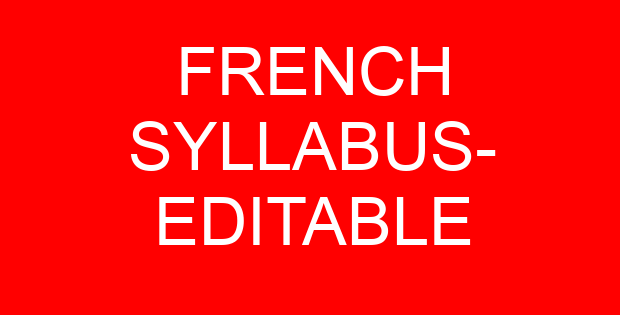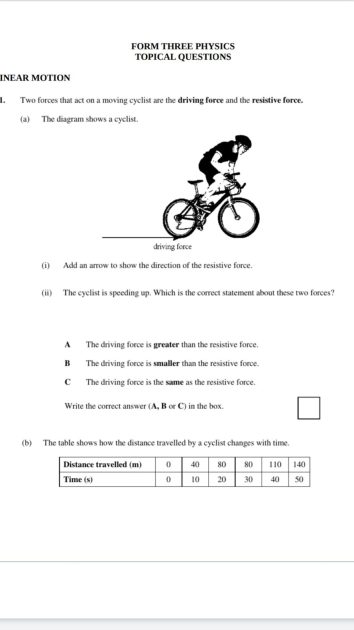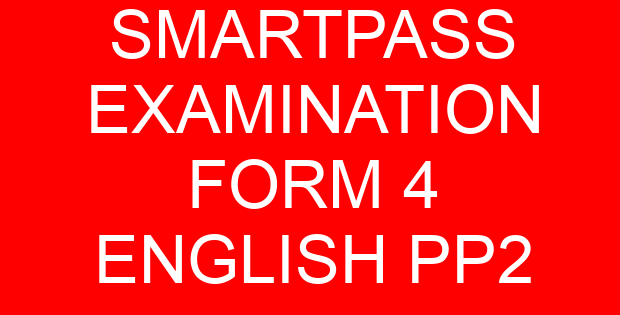FRENCH SYLLABUS- EDITABLE
501 – FRENCH SYLLABUS
GENERAL OBJECTIVES
The objectives of teaching French in secondary schools are to:
1) equip learners with the basic communicative skills for effective communication where
French is required;
2) give learners access to oral and written materials in French;
3) facilitate further studies in Francophone institutions;
4) promote global peace through the understanding and appreciation of the cultures of
French-speaking peoples and through a more positive perception of foreign peoples and
their cultures.
1.0.0 SKILLS
1.1.0 LISTENING AND SPEAKING SKILLS
These two skills should be developed side by side. Learners should be able to listen to a
variety of oral materials in French and extract information from them. They should be able to
communicate orally in real life situations and should articulate correctly. They should
understand the meaning and functioning of prosody (intonation, rhythm, liaison, etc.) and use
it in their speech.
1.2.0 READING SKILLS
Learners should have been exposed to authentic documents from a variety of written sources
such as comics, magazines, readers, newspapers, brochures, etc.
1.3.0 WRITING SKILLS
Writing and reading skills both demand visual recognition and comprehension of words and
structures. The two skills complement each other.
1.4.0 SPEECH ACTS AND GRAMMAR
It is vital for any language learner to both master and correctly use grammatical structures.
Since language is a vehicle of communication, grammatical structures and vocabulary should
have been learnt within communicative situations. Speech acts and grammar constitute the
content.
2.0.0 LISTENING AND SPEAKING SKILLS
2.1.0 Specific Objectives
By the end of the course, the learner should be able to:
a) respond to instructions and to other varied stimuli;
b) answer the telephone and convey oral messages;
c) answer questions on everyday topics;
d) manipulate in conversation the grammatical structures and vocabulary learned;
e) ask for and give directions to places;
f) express an opinion and give reasons;
g) narrate experiences in different tenses;
h) comment on oral information;
i) talk about personal experiences using a wide range of vocabulary;
j) dramatize real life situations (role-play);
k) extract information from recorded audio-visual material;
l) appreciate French spoken at varying speeds and in different registers (niveaux de langue);
m) speak with reasonable fluency and accuracy of articulation, liaison and intonation on a
variety of topics within their own experiences;
n) express themselves orally using a wide range of vocabulary and grammatical structures.
2.2.0 READING SKILLS
2.2.1 Specific Objectives:
By the end of the course, the learner should be able to:
a) read with understanding materials like advertisements, simple comics, novels,
dialogues and notices etc;
b) independently read materials from various sources e.g. newspaper articles, etc.;
c) read materials such as timetables. signs, poems, etc, to enable them to cope with a
francophone environment;
d) extract and manipulate information from the above texts;
e) read aloud set passages.
2.3.0 WRITING SKILLS
2.3.1 Specific Objectives
By the end of the course, the learner should be able to use correctly the vocabulary and
grammatical structures to:
a) write compositions based on a series of pictures;
b) write narratives (free composition);
c) write informal and formal letters and CVs;
d) write other functional/situational compositions e.g. dialogues;
e) write answers/questions to given stimuli. e.g. programmes, recipes, posters,
dialogues etc.;
f) answer complex questions;
g) solve puzzles;
h) fill in blanks, tables, forms etc.
2.4.0 SPEECH ACTS
2.4.1 Specific Objectives:
By the end of the course, the learner should be able to use the followings speech acts
and grammatical structures:
a) Making contact with others by:
· greeting/saying farewell;
· welcoming;
· apologising/giving apologies;
· attracting attention of someone;
· showing doubt;
· receiving calls/telephoning;
· confirming a statement;
· thanking someone;
· asking someone to wait/hold on/repeat;
· refusing politely;
· spelling names etc.;
· encouraging someone;
· giving/responding to instructions;
· talking about export/import.
b) Saying how one feels:
· expressing admiration, impatience, value judgement, a preference, a wish, interest,
an opinion, agreement, obligation, regret;
· expressing need and reason for doing something;
· giving advice;
· congratulating;
· making a comparison;
· saying one remembers/forgets.
c) Describing an item:
· Question/answer on identification, number, price, weight, size, colour, quantity.
d) Describing a person
· question/answer on name, identity, nationality, presence, place of residence,
languages spoken, profession, family, age, abilities/knowledge, habits/lifestyle
· question/answer on health, appearance, character
· saying one is new/late etc.
e) Describing an action
· Leisure activities
· Journeys
· Saying what one has done or one is going to do
· Recalling a past occasion
f) Describing an event
· question/answer on plans, projects, events
· recalling a past event
· question/answer on nature and sequence of events
g) Giving advice on
· Professions
· Health
· Ethical behaviour/social integrity
h) Describing place and time
· question/answer on date, time, distance
· question/answer on time for doing something
· making a reservations
· question/answer on place of work/school
· question/answer on where one is going
· question/answer on position of an object.
i) Communicating with others
· using formal and informal expressions in speech and in writing;
· asking for/giving advice, formation;
· writing a job application and CV;
· responding to advertisements;
· reassuring;
· promising
· announcing news;
· sending e-mail;
· asking someone to do something;
· offering/asking for something e.g. assistance;
· discouraging ;
· giving orders;
· wishing someone good luck etc.
2.5.0 GRAMMAR
2.5.1 Content
- Articles and nouns:
i) indefinite and definite articles;
ii) partitive article;
iii) gender and number of nouns;
iv) definite article w ith „d e‟and „a‟.
2 Pronouns (in the affirmative and negative)
i) subject pronouns
ii) emphatic pronouns
iii) direct/indirect object pronouns
iv) im personal pronouns: on, quelqu ‟un, tout le m onde, quelquechose)
v) partitive pronouns
vi) relative pronouns: qui/que (not with passé composé)
vii) possessive pronouns: le mien etc.
viii) demonstrative pronouns: celui etc
ix) pronouns following prepositions
x) expression for p resenting a person; C ‟est/V oici … …
xi) pronoun: chacun/chacune - Expressions of quantity:
– using cardinal and ordinal numbers
– using: beaucoup de, assez de, moins de, plus de, trop de
– using adverbial prepositions; presque, environ
d) Adjectives:
i) agreement in number and gender of adjectives
ii) possessive adjectives e.g mon
iii) adjectival expressions using „de‟e.g le livre de Paul
iv) comparative adjectives (plus —— que)
(moins —– que)
(aussi —— que)
v) superlative of regular and irregular adjectives
le/la/les plus/moins ——–de
le/la/les pires(s) de
le/la/les meilleur(e) (s) de
vi comparative of irregular adjectives:
bon – meilleur
maurais – pire
vi) demonstrative adjectives e.g. ce, cette etc. - Verbs (in the affirmative and negative forms)
i) present tense of regular and irregular verbs and reflexive verbs
ii) futur proche “aller + infinitif
iii) passe′com pose′of all verbs learnt
iv) past participle agreem ent w ith „avoir‟using direct object pronouns in the
affirmative only.
v) Second verb infinitives (e.g pouvoir + infinitif)
vi) „im parfait‟ of all the verb s covered
vii) „futur‟
viii) conditionnel présent” of the verbs cov ered
ix) imperative form
x) plus-que-parfait
xi) style indirect using: si, que, de.
xii) Subjonctif présent of regular verbs.
xiii) Subjonctif présent of some irregular verbs i.e. faire, venir, savoir, pouvoir, vouloir,
âtre, avoir, voir, aller, écrive, sortir, live, partir, mertre, prendre.
xiv) Subjonctif with the following verbs:
– il faut que
– j‟aim erais que
– jé voudrais que
– je souhaite que
– il est important que
– il est nécessaire que
xv) subjonctif with : – bien que
– avant que
– après que - Adverbs:
i) adverbs ending with – ment and their position in a sentence
ii) adverbs of place; ici, là, là – bas, partout, quelquepart
iii) adverbs of time: encore, déjà, toujours, quelquefois, souvent,
iv) adverbs of tim e sequ ence: d ‟abord, ensuite, en fin, souvent, aprés.
v) adverbial expression: il ya/depuis + expression of time - Negative forms:
(i) ne … … pas;
(ii) ne… … pas de;
(iii) ne … .. plus;
(iv) ne … ..jam ais;
( v) ne —- pasencore;
(vi) ne —- rien/rien ne —–;
(vii) ne —- personne;
(viii) ne —- que;
(ix) ne — ni — ni —.;
(x) personne ne ——-. - Interogative forms:
i) using intonation,
ii) using „est-ce que
iii) inversion of subject and verb
iv) using expressions: comment, où, qui est-ce qu e, qu ‟est-ce que, qu ‟est-ce qui, que, qui,
quel, il y a ——, combien de, quiest-ce.
v) using: lequel, quand, comment
vi) negative interrog ative w ith „si‟response - expressions of time and place
i) using prepositions en, à, de, sous, sur, devant, derrière, pour, dans, en face de, à
côté de, près de, loin de etc.
ii) expressing time using: – être en train de+ infinitif
– espérer que + futur
– être sur le point de + infinitif
– venir de + infinitif
iii) using adverbial pronouns „y ‟and „en ‟ - Link words / expressions: i) donc, car, alors
– quand + futur, présent, passé composé.
– et, ou, mais, après, puis
– à mon avis
– si —–que
– pour + infinitif
– avant de + infinitif
– sans + infinitif
3.0.0 LEXICAL
3.1.0 Specific Objectives
By the end of the course, the learner should be equipped with vocabulary and idiomatic
expressions related to the topics below:
3.2.0 Content
a) The French-speaking world;
b) The socialization aspect of humanity;
c) The family and its many concepts;;
d) The school and related activities
e) Professions and careers;
f) Leisure and hobbies;
g) Health and environmental issues;
h) Transport and travel;
i) Tourism and other economic activities;
j) Media and information technology.
4.0 ANNEX: VERBS
The following list of verbs is the minimum required for the course.
Irregular verbs
aller naître savoir
apprendre devoir partir sortir
avoir dire permettre sourite
battre dormir pouvoir suivre
boire écrire prendre tenir
comprendre étre promettre venir
condutire faire recevoir vouloir
connaitre lire revenir
courir mettre rire
croire mourir
4.1.0 Regular –er verbs
adorer écouter préparer
aider enseigner présenter
aimer entrer raconter
apporter fermer regarder
arriver frapper regretter
bavarder garder rencountrer
cacher goûter rentrer
causer habiter rester
chanter jouer retourner
chasser laisser saluer
chercher manger sembler
commencer marcher soigner
conseiller mesurer souhaiter
continuer monter tomber
couter montrer travailler
crier nager traverser
cultiver oublier trouver
danser parler visiter
dejeuner passer voler
demander pecher voyager
desirer penser
dessiner pleurer
detester porter
diner poser
donner pousser
4.2.0 Verbs with some irregular forms
achester essayer ouvrir
completer jeter peser
envoyer nettoyer préferer
espérer offrir
regular – ir verbs
choisir
finir
grandir
grossir
maigrir
punir
remplir
saisir
regular-re verbs
attandre
descendre
perdre
rendre
répondre
4.3.0 Reflexive Verbs
s‟am user se raser
s‟appeler s‟ reveiller
s‟ approch er de se sauver
s‟ approch er de se souvenir de
s‟asseoir se taire
se baigner se trouver
se brosser
se coucher
se dépêcher
se déshabiller
se peigner
se doucher
s‟habiller
s‟inquéter
s‟intaller
se laver
se lever
se promener
se rappeler
4.4.0 Impersonal Verbs
§a vaut
il faut
il pleut
il s‟agitde
il ya




